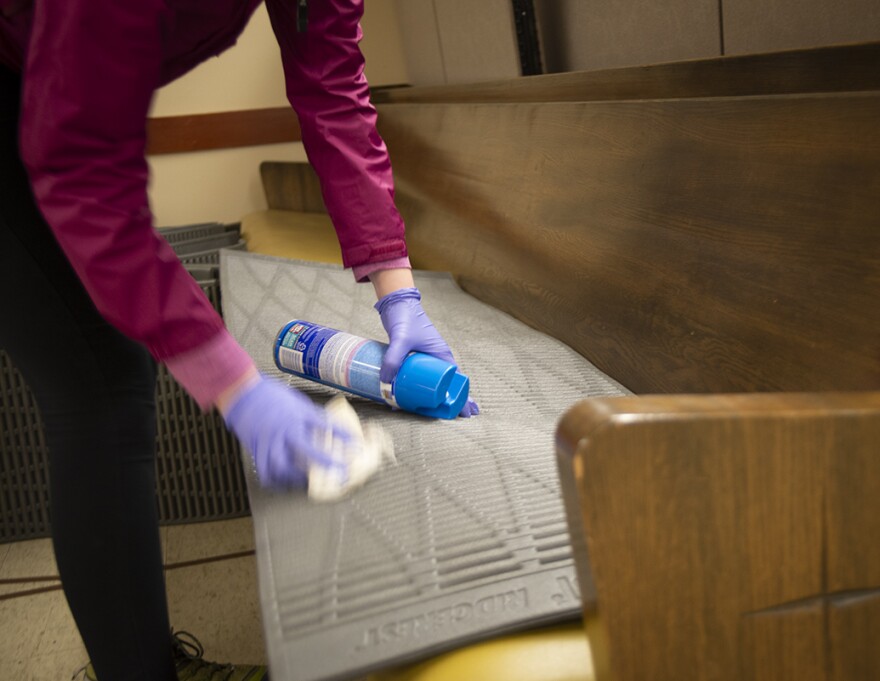A winter storm in southern Oregon brought temperatures down into the 20s this week, causing people to seek shelter in emergency winter centers.
But when health experts are telling people to maintain a 6 foot radius between yourself and others to prevent the spread of the coronavirus, is that possible when you’re sleeping on the floor of a church?
When a couple of dozen people started filing into an emergency shelter at the First Presbyterian Church of Ashland, it was clear that maintaining a radius wasn’t going to be possible.
“The question in my mind is, is it better for people to be out in the cold and not close together, or is it better to be in here?” says volunteer Avram Sacks. “Here, if one person has the virus, it’s going to spread to everybody.”
Organizer Jason Houk with the Southern Oregon Jobs For Justice says it’s going to be nearly impossible for people without homes to avoid contact with each other and the general public.
“This community, by its very nature, is very social,” Houk says. “It has to be. There is no quarantining yourself when you’re homeless, because there’s nowhere to go.”
Houk says it’s better for people who are homeless to sleep in a shelter and stay in one place. The controlled environment is safer, and it keeps potentially infected people who aren’t showing symptoms from spreading it elsewhere — like public parks, libraries or grocery stores.
“In order to make it safe for this community, in a way, we need to solve this homelessness crisis in this next week,” Houk says.
Bonnie Cohen is among the shelter guests tonight. She’s wearing a face mask because she’s seriously concerned about contracting coronavirus.

“I’m 47 years old,” Cohen says. “I’m single. I don’t have an emergency contact. And I live out of my car, which is having car troubles.”
Cohen says she often gets sick with the flu, and it knocks her out for a few days.
“And it happens every year,” Cohen says. “And this time, the thing that could make us sick, it could kill me.”
Feeling as vulnerable as she does, Cohen says she thinks it’s not a case of if the guests in this shelter will get the coronavirus — but when.
“Being unhoused, there’s really no chance whatsoever of not coming into contact with whatever is going on,” Cohen says. “It’s just a matter of how good is your immune system.”
Homeless advocates across the country are calling on local and federal agencies to provide permanent housing to help prevent the spread of this disease. About 2,000 of them convened in a phone conference on Monday, including Jerry Jones of the National Alliance to End Homelessness.
“There’s nothing worse than fighting the flu when you’re living on the streets,” Jones says.
Jones estimates that the federal government will need to invest billions of dollars into shelters to keep this disease from spreading among homeless populations, and to cover the costs of masks and other protective gear for the people who work there.
“If you're operating a shelter or a drop-in center, your workers don't have the option of telecommuting or distancing themselves always from clients,” Jones says. “And so we need a massive infusion of basic supplies and equipment.”
Also on that call was Barbara Dipietro of the National Health Care for the Homeless Council. She says homeless shelters and nonprofits are having to make difficult decisions about how to deal with people who are presenting coronavirus symptoms.
“Every community, its local emergency response system is responsible for identifying appropriate quarantine capacity in a community,” Dipietro says. “That should not be left to individual health care or homeless service providers to figure out what to do on their own.”
Monday’s conference call was organized by the National Low Income Housing Coalition, which subsequently developed a list of ways Congress can help people who are homeless. It included a call for $1 billion dollars for housing assistance and a moratorium on foreclosures and evictions.
But so far federal measures proposed by Congress and the Trump Administration haven’t addressed homelessness and the coronavirus. Housing advocates say they’ll continue to push for changes as this pandemic continues to spread into our communities.



